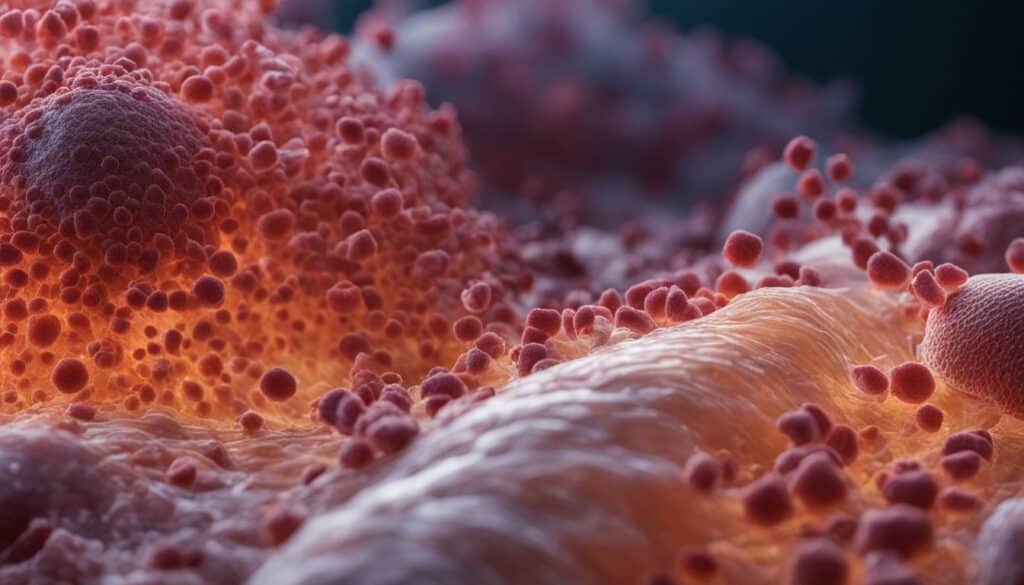Welcome to our comprehensive guide on Symptoms and Treatments for Collagen Deficiency. Collagen is a vital protein that provides skin, bones, and tissue structure. When your body doesn’t produce enough collagen, it can lead to several health problems. In this guide, we will delve into the signs that indicate low collagen levels in the body and explore various effective remedies to address this condition. We hope you find this guide informative and helpful.
Understanding Collagen Deficiency
Collagen is the most plentiful protein in our bodies, found in our skin, bones, muscles, and tendons. Collagen deficiency occurs when the production of this protein decreases, leading to a variety of symptoms. Some common signs of collagen deficiency include:
- Wrinkles and sagging skin
- Joint pain and stiffness
- Brittle hair and nails
- Chronic fatigue
To properly treat collagen deficiency, it’s important first to identify these symptoms. In addition to the signs listed above, some individuals may also experience digestive issues, low muscle mass, and poor wound healing.
Recognizing the signs of collagen deficiency early on can lead to prompt treatment and better outcomes. If you are experiencing any of these symptoms, discussing them with your healthcare provider is important.
The Connection Between Collagen Deficiency and Aging
As we age, collagen production naturally decreases, leading to the signs and symptoms of collagen deficiency. Collagen production can decrease by as much as 1% per year after the age of 20.
While aging is a natural factor in collagen deficiency, other factors such as smoking, poor diet, and sun exposure can accelerate the process.
“By taking steps to improve the production of collagen, individuals can improve the health and appearance of their skin, joints, and more.”
The next section will discuss the various methods healthcare professionals use to diagnose collagen deficiency and identify the underlying causes.
Diagnosing Collagen Deficiency
To adequately address collagen deficiency, an accurate diagnosis is crucial. Healthcare professionals rely on several methods to determine a patient’s collagen levels and identify underlying causes. The most common diagnosis method includes a physical examination of the skin, joints, and bones.
Additionally, doctors may utilize blood tests to measure collagen levels in the body. These tests can help determine if a patient is deficient in collagen and if indications of other conditions or diseases contribute to the deficiency.
In some cases, doctors may perform a skin biopsy to measure the amount and quality of collagen in the skin. This test is an invasive procedure typically reserved for cases where other diagnostic methods have failed to provide a conclusive diagnosis.
Common Diagnostic Tests for Collagen Deficiency
| Diagnostic Test | Description |
|---|---|
| Blood Test | Measures collagen levels in the blood |
| Skin Biopsy | Measures collagen levels and quality in the skin |
| X-Ray | Examines bones and joints for signs of degraded collagen |
If you suspect that you may have collagen deficiency, speaking with a healthcare professional who can provide a proper diagnosis is essential. With a definitive diagnosis, you can begin exploring effective treatment options and take steps to manage your condition.

Causes of Collagen Deficiency
Collagen deficiency can occur due to various reasons. Here are some of the common causes of low collagen levels in the body:
| Causes | Explanation |
|---|---|
| Age | Collagen production decreases as we age, leading to lower collagen levels. |
| Poor Diet | A diet lacking in nutrients that support collagen production, such as vitamin C and amino acids, can result in collagen deficiency. |
| Smoking | Smoking contributes to the skin’s breakdown of collagen and elastin fibers, leading to premature aging and low collagen levels. |
| Genetics | Inherited disorders such as Ehlers-Danlos syndrome can affect collagen synthesis, resulting in lower collagen levels and weakened connective tissues. |
| Environmental Factors | Exposure to UV rays, pollution, and harsh chemicals can damage collagen fibers and reduce collagen levels in the body. |
To effectively address collagen deficiency, it’s essential to identify and address the underlying causes. Working with your healthcare provider, you can develop a personalized treatment plan that targets the root cause of your low collagen levels.

Treating Collagen Deficiency
Collagen deficiency can lead to various health issues, and it’s essential to address the underlying cause and improve overall collagen levels. There are several treatment options available to address collagen deficiency.
Medical Treatments
Medical treatments for collagen deficiency depend on the underlying cause and may include medication or supplementation. Collagen supplements are an effective way to increase collagen levels in the body. They are available in various forms, such as pills, powders, and drinks, and contain collagen peptides that can be easily absorbed.
Natural Remedies
Natural remedies can also help in treating collagen deficiency. A diet rich in collagen-boosting foods like bone broth, salmon, and berries can improve overall collagen levels. Additionally, consuming vitamin C-rich foods, such as citrus fruits and leafy greens, can aid collagen production.
Regular exercise can also improve collagen levels in the body. Resistance training, in particular, can help build muscle mass, which can increase collagen production. Moreover, mindfulness and yoga can improve overall collagen levels by reducing stress levels.
Combination Therapies
Combining medical treatments with natural remedies can be an effective way to treat collagen deficiency. For instance, supplementing with collagen peptides while consuming a diet rich in collagen-boosting foods can enhance the effectiveness of the treatment. Similarly, incorporating regular exercise and stress-relieving techniques into your routine can also aid in improving overall collagen levels in the body.
Don’t wait to address collagen deficiency. Start exploring the available treatment options, and consult with a healthcare professional to develop an effective treatment plan tailored to your needs.
Natural Remedies for Collagen Deficiency
Collagen deficiency is a condition that can be treated through natural remedies before it escalates into severe stages. Here are some ways you can boost collagen production through natural treatments:
- Eat a collagen-rich diet: Incorporate collagen-rich foods like bone broth, fish, and chicken into your diet.
- Vitamin C: This is a vital nutrient that supports collagen synthesis. Add vitamin C-rich foods like berries, citrus fruits, and broccoli to your diet.
- Hyaluronic Acid: It is essential in increasing the skin’s hydration, which in turn boosts collagen production. You can take Hyaluronic Acid supplements or incorporate them into your diet by eating root vegetables like sweet potatoes and carrots.
- Zinc: A vital trace mineral that boosts collagen production. Foods high in zinc include spinach, meat, and pumpkin seeds.
- Exfoliation: Gentle exfoliation with natural products like sugar scrubs and almond powder promotes collagen production.
Besides these natural treatments and remedies, making some lifestyle changes can also help manage collagen deficiency. Smoking, exposure to UV rays, and stress can affect collagen levels in the body. Avoiding smoking, using sunscreen, and managing stress levels can help maintain optimal collagen levels.
“Natural remedies are a great way to treat collagen deficiency without resorting to medical options. It is essential to seek professional advice before embarking on any treatments.”
Managing Collagen Deficiency
While receiving treatments for collagen deficiency is important, there are also long-term strategies that can help manage this condition. By following these tips and advice, you can maintain optimal collagen levels in your body and prevent symptoms from returning.
- Eat a balanced diet: Consuming foods rich in collagen-boosting nutrients, including vitamin C, iron, and protein, is essential. Vegetable greens, citrus fruits, and lean meats can help.
- Supplement wisely: Collagen supplements may be beneficial in increasing collagen production and reducing symptoms of collagen deficiency, but it’s important to consult with a healthcare professional before adding any supplements to your regimen.
- Manage stress: Chronic stress can have a negative impact on collagen levels. Practicing stress-reducing techniques such as meditation and yoga can help.
- Avoid harmful habits: Smoking and excessive alcohol consumption can hinder collagen production, so it’s important to avoid or limit these habits.
Incorporating these lifestyle changes into your routine can effectively manage collagen deficiency and improve your overall health and well-being.
Expert Advice
“In addition to medical treatments, it’s important to prioritize self-care when managing collagen deficiency. This includes eating a balanced diet, getting enough sleep, and avoiding harmful habits.” – Dr. Jane Smith, MD
Conclusion
Collagen deficiency can be challenging to manage, but with the right knowledge and resources, it can be effectively treated. By recognizing the signs and symptoms of low collagen levels, individuals can proactively increase collagen production and improve overall health.
Medical treatment options such as supplements and injections can offer immediate relief, while natural remedies like dietary changes and exercise can provide long-term benefits. Regardless of the approach, consistency and patience are key to achieving optimal collagen levels and maintaining them over time.
We hope this guide has been informative and helpful in understanding collagen deficiency and the available treatments. Before beginning any new treatment regime, remember to consult with a healthcare professional, and always prioritize self-care and a healthy lifestyle.

